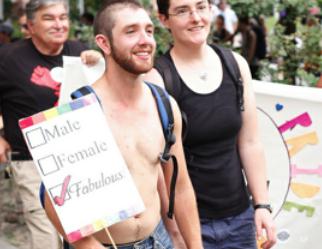Once again, the trans community has defied Pride Toronto and taken an unauthorized march down Yonge St to demand their rights.
The authorized Trans March, which started at Norman Jewison Park, was set to end at Church and Wood streets, but one group, organized by trans activist Christin Milloy, continued to march west along Wood St, onto Yonge, down to Dundas, north up University Ave and then back into the Village.
“We chose main streets because it’s critical that our political message is brought to the greater community,” Milloy says. “We need to get the issues out from behind the rainbow curtain. Pride Toronto runs a march that’s three blocks on Church St. The street’s already closed. It’s not bad, but it’s not really what a trans march looks like.”
About 200 marchers took part in the Trans March, with a majority continuing on with the unauthorized march.
Milloy says activists have been asking for two years to march on Yonge St. Last year, activist Stefonknee Wolscht organized a break-off march and led the group down Toronto’s busiest street for a few blocks.
This year, Milloy imagined a much grander route. With Wolscht behind the wheel of her pickup truck, Milloy coaxed the crowd to follow her to Yonge, down to Dundas, across to University Ave, up to Wellesley and back to Church St.
The Trans March is a recent addition to the Pride Week event roster.
“It’s growing and drawing support,” says Kevin Beaulieu, the executive director of Pride Toronto. “[The Trans March] is on Friday night. There are some logistical issues with the road and traffic, so we work with the city to try and find a time and a place that’s safe and a location where it can be put on successfully.”
Beaulieu says he is not opposed to moving the march to Yonge St in the future (see video interview below).
Chris Imrie, a student at Northern Secondary School who is a member of the Ontario InterGSA Association, a coalition of Catholic and public students fighting for gay-straight alliances, says transphobia awareness needs to be brought to non-queer spaces in Toronto.
“This is a public statement on the main streets of Toronto that transphobia is still an issue and will not be tolerated,” he says. “It needs to be eradicated from our society right now. We’re not waiting for it to get better later. We are making it better now, for everyone, everywhere.”
Marchers marked a major victory, the passage at Queen’s Park earlier in June of Toby’s Act, which adds gender identity and gender expression to the Ontario Human Rights Code. NDP MPP Cheri DiNovo, who was instrumental in pushing the bill, marched in solidarity. DiNovo will also march in the Pride parade on Sunday as the co-grand marshal, along with Liberal Laurel Broten, the provincial education minister.
With protection in place for trans and gender-variant people, Queer Ontario chair Nick Mulé says he now anticipates court challenges.
“This will open the Pandora’s box,” he says. “When complaints start coming forward with regard to employment, housing, services, contracts and all that stuff, people will start to realize that they can no longer discriminate against trans people.”
Milloy says there is still more work to be done. At the federal level, Bill C-279 has yet to pass. Canada’s Human Rights Act currently includes protections for gender identity but not gender expression.
Youth activist Alexander Monkler says the fight for human rights doesn’t stop in Ontario, or even Canada. “Trans rights need to be supported around the world. We are not there yet. We need to stand up and speak out. Equal rights for everyone.”
Below are a video report by Xtra’s Andrea Houston, a series of photographs by Kyle Lasky and a video interview with Pride Toronto executive director Kevin Beaulieu.

 Why you can trust Xtra
Why you can trust Xtra


